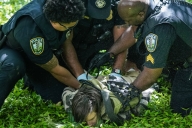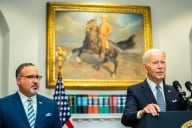You have /5 articles left.
Sign up for a free account or log in.
Does a research grant from the National Institutes of Health come with a caveat to block pornography from a campus’s network?
The 1,582-page, $1.1 trillion funding bill signed into law in January was seen as a victory for social science groups and supporters of academic research generally. It even included language on open access. One section later, however, the bill specified that “None of the funds made available in this act may be used to maintain or establish a computer network unless such network blocks the viewing, downloading, and exchanging of pornography.”
The language caught the attention of an observant grants administrator at the University of Pennsylvania late last month, who forwarded the question to an information security officer. He then posed the question to the Educause security constituent group listserv, on which people said they were confused by the provision. Days later, when the NIH sent out a notice of the new legislative mandate, the provision was also picked up by the biomedical research blog DrugMonkey. Its response: “Congress is losing it.”
Such a restriction could be troublesome to colleges and universities due to the First Amendment implications of censorship, and also because the language does not differentiate between obscenity and pornography. Would anthropologists be able to study ancient fertility idols? Could English professors assign Vladimir Nabokov’s Lolita? And would campuses have to prevent the non-scholarly viewing of porn on their networks?
The provision also goes beyond covering just the NIH. The language appears four times in the bill, covering the Departments of Commerce, Education, Health and Human Services, Homeland Security, and Labor, as well as their related agencies.
The porn ban appears to be a response to internal investigations conducted in 2009 and 2010 that showed federal employees of several agencies -- including the National Science Foundation -- occasionally deviated from their official duties to download and watch porn at work. The backlash came in the form of a ban proposed in the summer of 2010 by Rep. David Obey, the Wisconsin Democrat who chaired the U.S. House Committee on Appropriations until his retirement in January 2011.
On Thursday, a spokeswoman for the NIH indicated Obey’s 2010 amendment is the reason why the provision is included in the 2014 funding bill. She also provided the agency’s interpretation of the language:
“The entire university does not have to be blocked unless the grant funds are specifically requested to support any aspect of development or maintenance of a computer network, in which case that network must block the viewing, downloading, and exchanging of pornography,” the spokeswoman said in an email.
The NIH’s interpretation should exempt most, if not all, of its grant recipients, said Tony DeCrappeo, president of the Council on Governmental Relations. “I can’t imagine there would be many such grants,” he said.
Even so, the interpretation still doesn’t provide a clear definition of what sort of content should be blocked, said Tracy Mitrano, a higher education consultant (and blogger for Inside Higher Ed).
“Is there confusion in the mind of the legislators or drafters of this bill between pornography and obscenity -- the former being legal and the latter not?” Mitrano, former director of IT policy at Cornell University, said. “Even if we now we have an explanation about it being a divide between money for network construction and not, it still seems a little unusual -- and worth exploring.”
The Council on Government Relations helps universities navigate federal policy on research, but DeCrappeo said the restriction could be felt hardest by federal contractors -- if agencies decide to enforce the rule. Now that the dust surrounding the budget negotiations has begun to settle, he said, legislative oddities such as the pornography ban are bound to show up.
“We haven’t heard anything from other agencies if they’re ... considering implementing it,” DeCrappeo said. “At some point you would think those agencies might decide they need to issue something. But again, they may determine that it’s just not something they do.”








